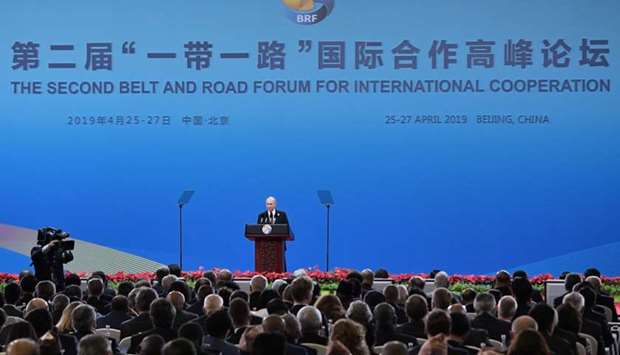Qatar is among the very first countries to have supported the Belt and Road Initiative that aims for wider links between Asia, Africa and Europe, HE the Minister of Transport and Communications Jassim Seif Ahmed al-Sulaiti said Friday in Beijing.
HE the Minister of Commerce and Industry Ali bin Ahmed al-Kuwari and HE al-Sulaiti are representing Qatar at the 2nd Belt and Road Forum for International Co-operation, inaugurated yesterday in Beijing by Chinese President Xi Jinping.
“Qatar signed several agreements and MoUs that support that initiative,” HE al-Sulaiti pointed out, according to a statement from his ministry.
“This returns positively on Qatar’s economy and supports its plan to becoming a key strategic and economic hub in the region and the world,” he said.
In Qatar, he said, “we look at the Belt and Road Initiative or the 'Silk Road' from a strategic standpoint to link it with all our infrastructure such as ports and airports. This helps reduce time and cost for transporting goods. At the same time, it will be the road for the passage of such goods from China to all countries around the world.”
He said that Qatar has an advanced world-class infrastructure in seaports, air transport and airports, in addition to its development operations in the logistics sector to fulfil the increased demand on transportation, handling and storage needs, let alone Qatar’s economic ties with several countries.
“The Belt and Road Initiative, best known as Silk Road, which China launched in 2013, will contribute to creating new industrial cities and communities in a way that supports growth and common benefits for countries on its path,” said HE al-Kuwari.
The Silk Road, he said, would make Qatar a key economic and strategic hub in the region and the world and allow for new significant economic alliances and partnerships, making it a pivotal and active player in world trade.
He also noted that Silk Road would complete the role modern infrastructure plays in Qatar in transport industry such as ports and airports and maximise the benefit in a manner that achieves the desired economic development.
HE al-Sulaiti participated in a working session on the connectivity between infrastructure and transport that was attended by several ministers and senior officials at the forum. HE al-Kuwari also participated in a sub-forum on the interdependence of trade, covering some topics about the deepening of trade connection in light of the Belt and Road co-operation through openness, inclusion and innovation.
In a meeting they held with Argentine Minister of Foreign Affairs Jorge Marcelo, Ministers al-Sulaiti and al-Kuwari exchanged viewpoints on the Belt and Road Initiative and discussed a number of topics of common interest.
Heads and leaders of 37 countries or governments are attending the two-day forum. It has attracted nearly 5,000 participants from more than 150 countries and 80 international organisations, covering regions from five continents and multiple players such as governments, civil societies, business communities and academia.
The theme of the 2nd Belt and Road Forum is "Belt and Road Co-operation, Shaping a Brighter Shared Future." The main purpose is to promote the high-quality development of Belt and Road co-operation, which is the common aspiration of countries participating in the initiative.
Qatar and China signed an MoU on promoting their co-operation in the building of the Silk Road during His Highness the Amir Sheikh Tamim bin Hamad al-Thani’s visit to China in 2014. This has since opened the door for fast-paced and comprehensive development in Qatari-Chinese relations.
Last January, the two countries also signed an MoU on promoting their co-operation and partnership with regards to the Belt and Road Initiative. This made the two countries ready more than ever to strengthen their cooperation and work for shared interests.
Qatar is also a founding member of the China-led Asian Infrastructure Investment Bank - a new international financial institution that aims to meet infrastructure needs in Asia within the framework of the Belt and Road Initiative.

